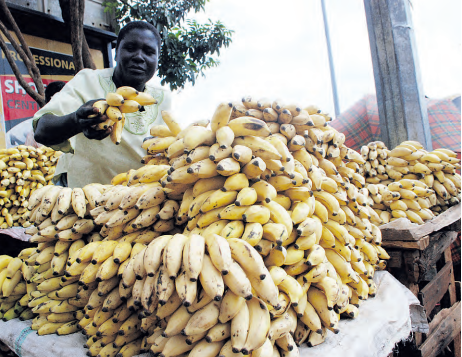

UN agencies are collaborating with Nyamira and Laikipia counties to help banana farmers transform agricultural waste into valuable products.
This is in a bid to tackle environmental pollution, boost incomes, reduce food wastage and losses, and strengthen community resilience to climate change.
Through the Circular Economy in the County Aggregation and Industrial Parts (CAIPs) project, farmers will gain skills to establish eco-industrial parks where they can add value to waste from bananas and livestock.
This initiative seeks to position Kenya as an early adopter of the green and blue economy. Recently, 40 participants from the banana value chain, public sector and community-based organisations took part in training on circular economy principles and sustainable agro-food value chains linked to eco-industrial parks.
Grace Kerubo, a member of Manga Heart Banana Cooperative Society in Nyamira county, said the training was an eye-opener.
She said they have been using some banana waste, like fibres from pseudostems to make baskets and sell to textile companies.
“But we never realised we could earn even more by adding value and commercialising the business,” she said.
Manga Heart is one of the groups enlisted in the project. Kerubo said they now extract banana fibres and sell to textile manufacturers in Makueni and Nairobi counties.
The farmers produce around 150 kilogrammes of fibre per month, generating about Sh97,500 monthly. Their goal is to scale up production to one tonne (1,000kg) per month.
“To achieve this, we need more decorticator machines, advanced training to improve efficiency and marketing expertise to access export markets,” she said.
Fred Kong’ong’o from UNIDO said through this project, beneficiaries will receive support in market linkages, financial services and business expansion.
Kenya aspires to achieve higher income levels through industrialisation anchored in agro-processing and value addition.
Nyamira’s director of trade, investment and finance Dominic Barare said the concept of a circular economy is relatively new in Kenya.
“We need a lot of advocacy and simplified messaging to ensure the common mwananchi understands and benefits from it,” he said.
Joseph Mbeva, representing the Industrialisation secretary, said the Circular Agro-Industrial Parks (CAIP) project is being piloted in Nyamira and Laikipia counties, with hopes of replicating its success nationwide.
“This joint programme on circularity is a key driver in Kenya’s transition from a linear to a circular economy,” he said.
As part of the training, participants visited Nawasscoal Limited, a company that converts human waste into green energy for cooking.
By producing and selling carbonised briquettes made from treated sludge, Nawasscoal helps reduce reliance on firewood, decrease deforestation, and mitigate health risks associated with smoke fumes.
The company also produces organic fertilisers, further promoting sustainability. This initiative is supported by UN agencies FAO, IOM and UNIDO, with a focus on building circular and sustainable agri-food systems in Kenya.


